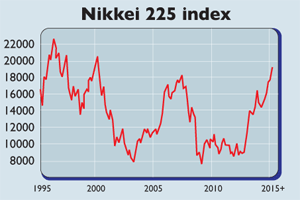Nikkei breaks 20,000 – can it go higher?
Japan's benchmark index, the Nikkei 225, has hit a peak last seen in April 2000.

Get the latest financial news, insights and expert analysis from our award-winning MoneyWeek team, to help you understand what really matters when it comes to your finances.
You are now subscribed
Your newsletter sign-up was successful
Want to add more newsletters?

At the same time, Abenomics, the three-pronged revival programme from Prime Minister Shinzo Abe, is showing signs of progress, with firms raising wages. Although the economy "is still limping out of a recession from the second to fourth quarters of last year", this weak growth "has only convinced investors that the BoJ will unveil another trick in its sleeve".
In other words, expect more quantitative easing (QE) if the economy fails to pick up which, based on what's happened during previous rounds of money printing, seems likely to boost stocks further.
Can stocks go higher?
Recent news stories suggest this trend is finally under way last month's announcement that successful but notoriously shareholder-unfriendly robotics firm Fanuc is bowing to pressure from investors for more transparency and higher payouts may be a turning point. "With dividends and share buybacks also expected to rise, cash equities buying by foreign investors is expected to continue in a sustained way," says Shun Maruyama of BNP Paribas.
Try 6 free issues of MoneyWeek today
Get unparalleled financial insight, analysis and expert opinion you can profit from.

Sign up to Money Morning
Don't miss the latest investment and personal finances news, market analysis, plus money-saving tips with our free twice-daily newsletter
Don't miss the latest investment and personal finances news, market analysis, plus money-saving tips with our free twice-daily newsletter
Japan is also benefiting from what Chao Deng in the Wall Street Journal calls an "increasing global appetite for Asian stocks". Hong Kong's Hang Seng index "ended a three-day week up 7.9% at 27,272.39 as its rally accelerated". This was the biggest weekly gain since October 2011. Against this favourable backdrop, there's a growing consensus that Japan will make further gains.
True, there's a risk that the Nikkei "may have risen too far too fast" in the shorter term, says Maruyama, but the index is still likely to end the year higher at around 22,000. Others are far more optimistic:Ben Collett of Sunshine Brokers thinks that there's "a 50% chance the Nikkei will rise to 30,000 in a year's time".
Get the latest financial news, insights and expert analysis from our award-winning MoneyWeek team, to help you understand what really matters when it comes to your finances.

-
 Do you face ‘double whammy’ inheritance tax blow? How to lessen the impact
Do you face ‘double whammy’ inheritance tax blow? How to lessen the impactFrozen tax thresholds and pensions falling within the scope of inheritance tax will drag thousands more estates into losing their residence nil-rate band, analysis suggests
-
 Has the market misjudged Relx?
Has the market misjudged Relx?Relx shares fell on fears that AI was about to eat its lunch, but the firm remains well placed to thrive